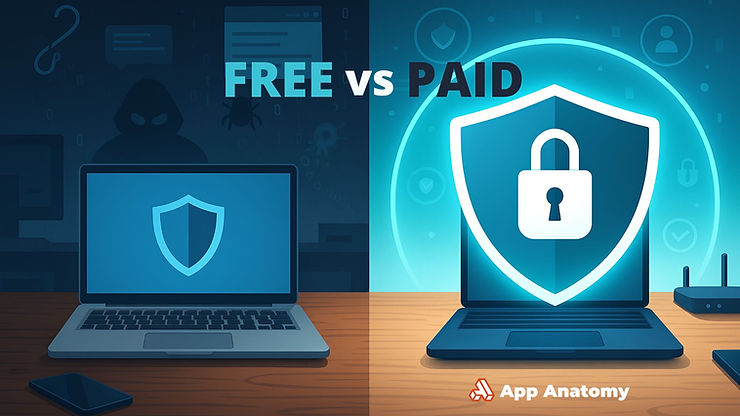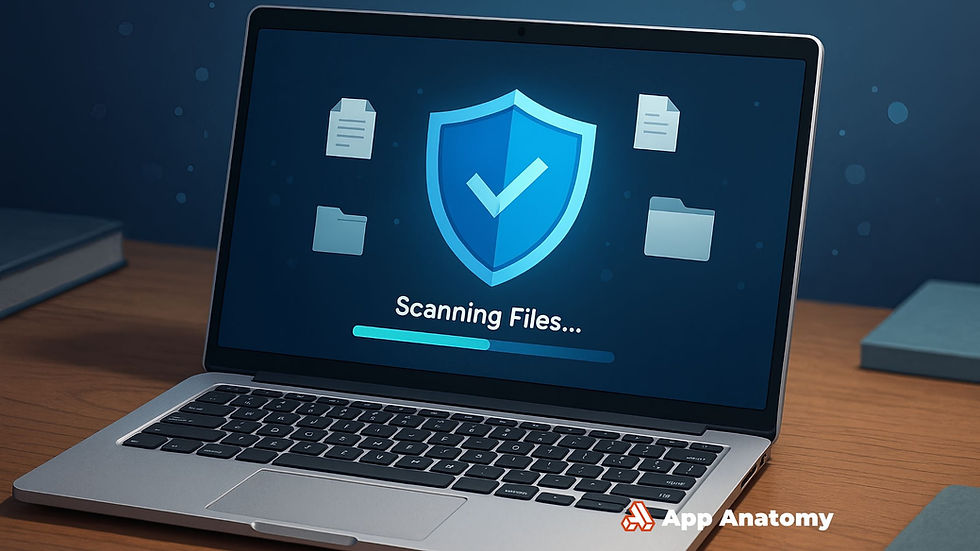The Truth About Paid vs Free Antivirus: What’s the Better Choice
- Jun 17
- 5 min read

When it comes to antivirus software, we all want one thing: solid protection that doesn’t bog down our devices. And if it’s free? Even better.
But here’s the catch, paid vs free antivirus isn't just about cost. It’s about how much protection you actually get, and whether free tools can keep up with today’s threats. Spoiler alert: sometimes they can, but often they fall short.
So, how do you decide between free antivirus and a paid option?
What You Will Learn in This Article
The core differences between paid and free antivirus software
What features free antivirus tools typically lack
Who should stick with free antivirus and who needs to upgrade
Pros and cons of premium antivirus programs
Real-world use cases for both types of protection
Whether paying for antivirus is truly worth it in 2025
What Is the Real Difference Between Paid and Free Antivirus?
Paid vs free antivirus refers to the comparison between no-cost security software and full-featured, premium protection suites. While free antivirus tools offer basic malware defense, paid antivirus software usually adds critical extras, like phishing protection, ransomware defense, and support for multiple devices.
Understanding this distinction helps you avoid overpaying for features you don’t need, or worse, under-protecting your system.
Free Antivirus: What You’re Getting (and What You’re Not)
Think of free antivirus software as your digital security starter pack. It covers the basics, but if you’re dealing with anything more than casual internet use, it may leave gaps.
What Free Antivirus Typically Offers
Malware scanning and detection
Scheduled scans for ongoing protection
Basic real-time threat detection
Minimal system impact for older devices

It’s a good option if you’re budget-conscious and only browse trusted sites, don’t store sensitive data, and rarely download new software.
But Here’s What Free Antivirus Lacks
Ransomware protection is often missing or limited
Phishing detection is rarely included in free plans
No VPN for encrypted, private browsing
Password managers and parental controls are absent
Customer support is usually limited to forums or self-help guides
Frequent ads and upgrade prompts can get annoying
These trade-offs raise the common question: Is free antivirus enough or should I buy a premium version?
Paid vs Free Antivirus: A Quick Comparison
Here’s a side-by-side look at the most noticeable feature gaps between paid and free antivirus software:
Feature | Free Antivirus | Paid Antivirus |
Malware Protection | Basic | Advanced + AI-based |
Ransomware Defense | Rare or limited | Strong & proactive |
Phishing Protection | Usually missing | Often included |
VPN Access | Absent | Bundled in many suites |
Password Manager | Not available | Common in paid suites |
Parental Controls | No | Yes, in family plans |
Customer Support | Limited to forums | Live chat / phone |
Ads & Upsells | Frequent | None |
Multi-Device Support | Rare | Standard in most plans |
So if you’re wondering, “Does paid antivirus offer better protection than free?”, the answer is yes, especially if you're dealing with sensitive tasks like banking, file sharing, or working remotely.
Who Is Free Antivirus Best Suited For?
Free antivirus is not useless, far from it. But it’s definitely not a one-size-fits-all solution.
Ideal for:
Casual users who browse, stream, and email with caution
Single-device households that avoid risky downloads
Students or minimal users who just need lightweight protection
Anyone asking, “Can a free antivirus protect against basic threats?”
That said, you still need to be cautious. Many so-called “free” antivirus apps are loaded with trackers, weak protection, or worse, malware disguised as security software. Stick with reputable brands, even if you're not paying.
Who Really Needs Paid Antivirus Protection?
Let’s be honest, not everyone needs paid antivirus. But for the right user, it can make a huge difference. If you're wondering “Should I pay for antivirus or stick with free?”, here’s who benefits the most from going premium.
Families and Multi-Device Users
If your household includes laptops, tablets, smartphones and especially kids, paid antivirus suites offer multi-device coverage, parental controls, and identity protection across platforms.

This goes far beyond what a free antivirus program can handle. You’re not just protecting your own data, you’re protecting everyone’s digital life in your home.
Remote Workers and Small Business Owners
If you work from home, handle sensitive client files, or connect to corporate servers, the difference between paid and free antivirus becomes even more critical. You’ll want tools like:
Ransomware protection for financial and legal documents
Phishing defense for business email compromise
VPN for secure access to company data
Firewall and webcam protection to prevent spying
This level of defense simply isn’t available with free antivirus software.
Anyone Handling Personal or Sensitive Data
Do you do online banking, manage medical records, or store tax files digitally?
Then paid vs free antivirus is no longer a casual decision, it’s a risk management issue. Paid antivirus programs typically include extra safeguards like:
Password managers
Data leak alerts
Encrypted cloud backups
If your digital privacy matters, paying for antivirus software becomes more of an investment than an expense.
Paid vs Free Antivirus: Pros and Cons Recap
Let’s break it down in a way that’s easy to decide which antivirus you should choose, free or paid option:

Pros of Paid Antivirus
Full-spectrum protection, including phishing, spyware, and ransomware
Access to premium features like VPNs and parental controls
Dedicated customer support
Multi-device support (PC, Mac, Android, iOS)
Regular updates and real-time scanning with fewer false positives
Cons of Paid Antivirus
Annual subscription fees ($20–$100+)
Some bundles include features you may never use
Subscription fatigue, yet another renewal to manage
If you've ever asked, "Why should you pay for antivirus when free ones exist?", these are the answers.
Choosing Between Paid or Free Antivirus
So, which antivirus is better: paid or free? The truth is, there’s no universal answer.
It depends on how you use your devices, what data you store, and how much risk you’re willing to take. Here’s a simple way to think about it:
Free antivirus is fine for casual users who don’t store sensitive data or use multiple devices.
Paid antivirus is worth it for families, remote workers, and anyone serious about protecting their digital life.
Still unsure? Start with a reputable free antivirus, then upgrade if you find yourself needing more. Many paid options offer a free trial so you can test before committing.
It's About Risk, Not Just Cost
The paid vs free antivirus debate isn’t really about software, it's about risk tolerance.
Do you value convenience, support, and layered security?
Or are you okay with just the basics and troubleshooting on your own?
In 2025, cyber threats are more advanced than ever. Whether you go free or premium, just don’t go unprotected.





Comments